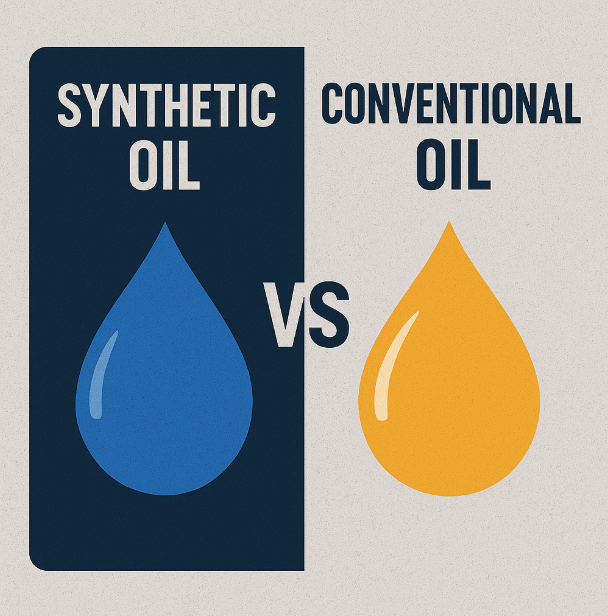The debate between synthetic and conventional oil has been raging in garages and online forums since the 1970s when synthetic first hit the mainstream market. For hot rodders and performance enthusiasts, this choice isn't just about following the manufacturer's recommendations—it's about protecting your pride and joy and maximizing its potential. Let's cut through the marketing hype and get down to the nuts and bolts of what really matters.
The Fundamental Differences
Conventional oil is refined from crude petroleum, a natural product pulled from the earth. It contains a variety of hydrocarbon chain lengths and impurities, even after refining. Think of it as a mixed bag—some good stuff, some not-so-good stuff.
Synthetic oil, by contrast, is engineered in a laboratory. The molecules are uniform in size and shape, created specifically for engine lubrication. The uniformity gives synthetic oil predictable, consistent performance in extreme conditions that conventional oil simply can't match.
Where Synthetic Dominates the Track
For those building high-performance engines, synthetics offer several undeniable advantages:
Temperature Stability: Synthetic oils maintain their viscosity across a much wider temperature range. When you're pushing your engine hard and oil temps climb north of 250°F, conventional oils begin to break down. Synthetics keep protecting even when the heat is on.
Shear Resistance: In high-stress areas like camshaft lobes and bearings, oil molecules get physically torn apart under pressure—a process called "shearing." Synthetic molecules resist this better, maintaining their protective film even under brutal conditions.
Flow Characteristics: When temperatures plummet, conventional oil thickens dramatically. Synthetic flows more readily at cold temps, getting to critical engine components faster during those first crucial seconds of startup—when most engine wear occurs.
Cleanliness: The uniform molecular structure of synthetic oil resists forming sludge and deposits. For forced induction setups where oil temperatures soar, this cleanliness factor becomes even more important.
When Conventional Still Makes Sense
Despite synthetic's technical advantages, conventional oil remains a valid choice in certain scenarios:
Break-In Periods: Many engine builders still prefer conventional oil for breaking in a fresh rebuild. The higher friction characteristics help seat rings properly, and the mineral content works well with new camshafts.
Classic Engines: Older engines with looser tolerances sometimes experience more leakage with slippery synthetics. If your vintage mill starts marking its territory after switching to synthetic, you might need to return to conventional.
Budget Constraints: Let's be real—synthetics cost significantly more. For daily drivers and weekend cruisers that aren't pushed hard, conventional oil changed more frequently can be a reasonable compromise.
Compatibility Concerns: Some older seal materials weren't designed with synthetic oils in mind. If you're running a decades-old engine with original seals, a switch to synthetic might reveal weak points.
The Hybrid Option: Synthetic Blend
For those caught between worlds, synthetic blends offer a middle ground. These oils combine conventional base stocks with a percentage of synthetic components, delivering some advanced protection without the premium price tag. They're particularly popular for:
-
Moderately modified street engines
-
Towing applications
-
Higher-mileage engines that might not tolerate full synthetic
-
Budget-conscious enthusiasts seeking better-than-baseline protection
The Real-World Performance Gap
In controlled testing, the differences are measurable but sometimes overstated in marketing. Here's what you can realistically expect when switching from conventional to synthetic:
-
Approximately 1-2% fuel economy improvement
-
Reduced engine wear, especially during cold starts
-
Extended drain intervals (though I still recommend sticking close to manufacturer recommendations)
-
Better heat management in extreme driving conditions
-
Improved protection during extended idle periods
What you won't see is massive horsepower gains or magical restoration of worn components. Oil is about protection, not performance enhancement.
Making Your Choice: A Decision Matrix
Consider synthetic oil if:
-
You've invested in forced induction or other power adders
-
Your vehicle sees track time or aggressive driving
-
You experience extreme temperature conditions
-
Oil temps consistently run high
-
You value extended drain intervals
Stick with conventional if:
-
You're breaking in a fresh rebuild
-
Your vintage engine has original seals
-
Budget is a primary concern and you change oil frequently
-
You're experiencing leaks with synthetic oil
-
Your manufacturer specifically recommends it
The Bottom Line: Quality Matters More Than Type
Here's the truth that oil companies don't advertise: a high-quality conventional oil changed regularly beats poor-quality synthetic that's left in too long. Whatever you choose, prioritize:
-
Correct viscosity for your application
-
Meeting or exceeding manufacturer certifications
-
Consistent change intervals based on usage
-
High-quality filters paired with your oil of choice
For most hot rodders with modified street engines, modern synthetic oils provide measurable benefits worth the investment. But don't let anyone shame you if budget or specific technical concerns keep you in the conventional camp—just change it regularly and your engine will reward you with miles of trouble-free performance.
After all, our passion isn't about what goes into the engine—it's about the experience behind the wheel once it's running right.

